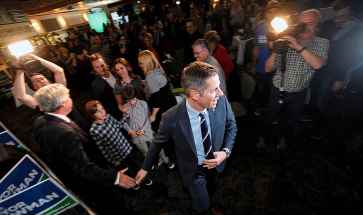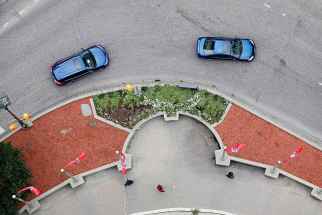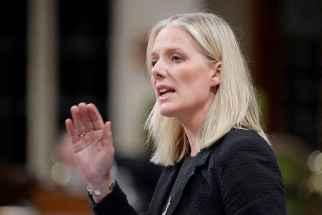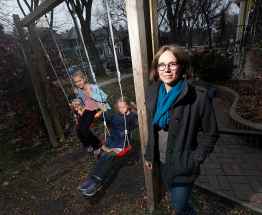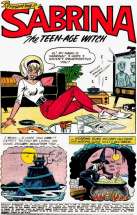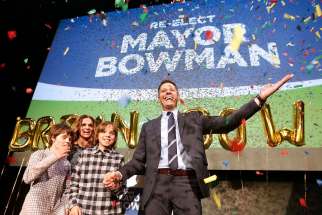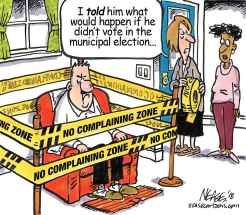Winnipeg votes for same, but change is inevitable
Read this article for free:
or
Already have an account? Log in here »
To continue reading, please subscribe:
Monthly Digital Subscription
$0 for the first 4 weeks*
- Enjoy unlimited reading on winnipegfreepress.com
- Read the E-Edition, our digital replica newspaper
- Access News Break, our award-winning app
- Play interactive puzzles
*No charge for 4 weeks then price increases to the regular rate of $19.00 plus GST every four weeks. Offer available to new and qualified returning subscribers only. Cancel any time.
Monthly Digital Subscription
$4.75/week*
- Enjoy unlimited reading on winnipegfreepress.com
- Read the E-Edition, our digital replica newspaper
- Access News Break, our award-winning app
- Play interactive puzzles
*Billed as $19 plus GST every four weeks. Cancel any time.
To continue reading, please subscribe:
Add Free Press access to your Brandon Sun subscription for only an additional
$1 for the first 4 weeks*
*Your next subscription payment will increase by $1.00 and you will be charged $16.99 plus GST for four weeks. After four weeks, your payment will increase to $23.99 plus GST every four weeks.
Read unlimited articles for free today:
or
Already have an account? Log in here »
Hey there, time traveller!
This article was published 25/10/2018 (2607 days ago), so information in it may no longer be current.
One of the undeniable attributes of the mostly rational but often conflicted human species is its aversion to change.
With their votes in this week’s civic election, Winnipeggers put their humanity fully on display. Wherever the opportunity was presented, the local population — or, at least, the 42 per cent who bothered to cast a ballot — voted for more of the same.
More of Brian Bowman as the city’s mayor. More representation from every incumbent (except one, who was competing in a reconfigured riding against another incumbent) whose name was on a civic ward ballot. And more of the same — meaning more vehicular traffic, and a lot less talk about allowing pedestrians to cross — at Portage and Main.

When it comes to the Portage and Main plebiscite, what’s interesting — and surely, most discouraging to the urbanist thinkers who believe reopening the iconic intersection would contribute greatly to Winnipeg’s character and promise — is that from the beginning of the election campaign to the final vote count, all the considerable efforts of the “Vote Open” movement, from advertising and brochures to bold traffic-realignment plans to a final-weekend pep rally gathering at the intersection, failed to move the public-opinion needle in any meaningful way toward reintroducing pedestrian traffic.
A late-August poll suggested 67 per cent of Winnipeggers opposed reopening the intersection to pedestrians, while only 33 per cent favoured it. On election day, 64.99 per cent voted “No” in the plebiscite, and 35.01 per cent voted “Yes.”
There was no organized “Vote Closed” campaign; those opposed to reopening the intersection merely negotiated a referendum question onto the ballot, and then left it to human nature to do the rest. And Winnipeggers delivered a more-of-the-same vote by an emphatic margin of nearly two to one, with the heaviest concentrations of “No” votes emanating from the suburbs most geographically distant from the subject-of-debate intersection.
In his victory speech and also in a post-address interview, Mr. Bowman reiterated his pledge to respect the plebiscite result, stating that he will not raise or support the issue of reopening the intersection when the new city council begins its term.
Despite Winnipeggers’ endorsement of the status quo, however, the new council will necessarily bring a sense of renewal to city hall. Five new faces will occupy council-chamber chairs, and with the departure of vocal veterans Jenny Gerbasi and Russ Wyatt from civic politics, it will be interesting to see who emerges as Mr. Bowman’s most ardent supporters and assertive opponents.
Winnipeggers might be comforted by the idea that this will be a business-as-usual city council, but the reality is that there will be a need for significant and aggressively instituted change in the next four years. Winnipeg’s meth-addiction crisis is going to get worse, or better. Winnipeg’s property-crime rate is going to get worse, or better. Winnipeg’s physical infrastructure, from streets and sidewalks to crumbling recreation facilities, is going to get worse, or better. Winnipeg’s relationship with its fast-growing Indigenous population is going to get worse, or better. Winnipeg’s civic-budget balance sheet is going to get worse, or better, as is its relationship with the provincial government on which it depends for many of its funding agreements.Winnipeggers showed with their votes that they don’t easily embrace change
Winnipeggers showed with their votes that they don’t easily embrace change, but the most important issues facing the city demand that things do not remain the same.
That is the daunting task that awaits Winnipeg’s newly elected mayor and councillors.

